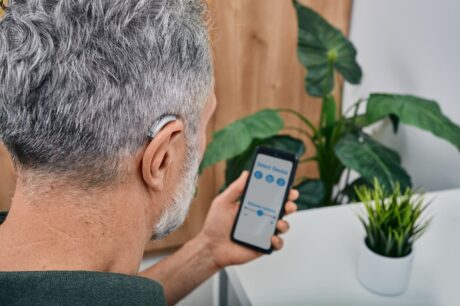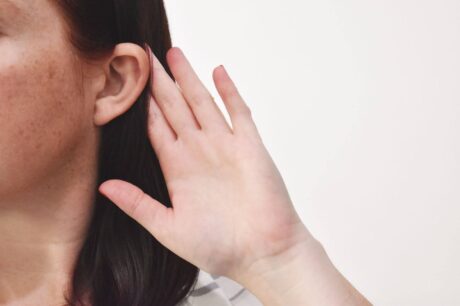Loud music has long been a part of social gatherings, concerts, and daily commutes, but prolonged exposure can lead to permanent hearing damage. This condition, known as noise-induced hearing loss, is a growing concern, affecting people of all ages, but especially young people.
This blog delves into how noise exposure affects your ear health, explores the risks associated with high decibel levels, and reveals what you can do to protect your hearing and avoid suffering from the hidden struggles of hearing loss. We’ll equip you with the knowledge to make informed choices about your listening habits and safeguard your hearing for years to come.
How Sound Travels and Impacts Hearing
Sound travels in waves that enter the ear and are channelled through the ear canal to the eardrum. These vibrations cause the eardrum to move, which in turn sets off a chain reaction in the middle ear, where tiny bones amplify the sound. Finally, the vibrations reach the inner ear, specifically the cochlea. Inside the cochlea are thousands of delicate hair cells that bend in response to sound vibrations, converting them into electrical signals that are sent to the brain, where they are interpreted as sound.
Excessive exposure to loud music can overwork and damage these delicate hair cells. Imagine these hair cells like blades of grass in a field. A gentle breeze (soft sounds) might cause them to sway, but a strong wind (loud music) can bend them or even break them. Once these hair cells are damaged or destroyed, they cannot regenerate, leading to permanent hearing damage and noise-induced hearing loss.
Decibel Levels: The Loudness Scale
Sound intensity is measured in decibels (dB). The higher the decibel level, the louder the sound. Generally, sounds below 85 dB are considered safe for prolonged exposure. However, any sound above 85 dB can potentially cause hearing damage, especially with prolonged or repeated exposure.
To understand the potential for hearing damage, it’s important to be aware of the decibel levels of common sounds:
- Safe Listening: Sounds below 85 dB are generally considered safe for prolonged exposure. This includes moderate rainfall (50 dB), normal conversations and everyday household noises (around 60 dB).
- Risky Listening: Any sound above 85 dB can potentially cause harm to your hearing, especially with prolonged or repeated exposure. This includes city traffic (around 85 dB), motorcycles (95 dB), and power tools (90-110 dB).
- Dangerous Listening: Sounds above 100 dB pose a significant risk of hearing damage even with short-term exposure. This includes loud concerts (110-120 dB), sporting events, and personal music players at maximum volume (105 dB).
It’s important to remember that the duration of exposure also matters. The louder the sound, the shorter the amount of time it takes to cause damage. For example, listening to music through earbuds at half volume (around 95 dB) for an extended period can be just as harmful as attending a loud concert for a shorter duration.
The Sneaky Nature of Noise-Induced Hearing Loss
Noise-induced hearing loss often develops gradually, making it easy to overlook in its early stages. You might not notice subtle changes until the damage becomes more significant. Some common signs and symptoms include:
- Tinnitus: A ringing, buzzing, or hissing sound in the ears
- Difficulty understanding speech in noisy environments
- Muffled hearing
- Needing to turn up the volume on electronics
Unfortunately, noise-induced hearing loss is irreversible. That’s why prevention and early detection are crucial.
Protecting Your Hearing: Tips for Safe Music Listening
You can still enjoy your favourite music while protecting your ears. Here are some tips:
- Turn down the volume: Keep the volume on your personal music devices and in concert venues at a safe level. A good rule of thumb is to keep it low enough that you can still hear someone talking to you nearby.
- Wear hearing protection: Use earplugs or noise-cancelling headphones in loud environments, especially concerts, clubs, and sporting events.
- Take listening breaks: Give your ears a rest by taking breaks from listening to loud music. Even a few minutes can make a difference.
- Monitor your hearing: Get regular hearing check-ups at a hearing test clinic to monitor your hearing health and detect any early signs of hearing loss.
When to Seek Professional Help

If you experience any signs of hearing loss, such as tinnitus (ringing in the ears) or difficulty understanding speech in noisy environments, it’s essential to seek professional help promptly. Early intervention is crucial in managing hearing loss and preventing further damage. This is especially important for children, as early detection and intervention can significantly impact their speech and language development. If you suspect your child might be experiencing hearing difficulties, it’s crucial to be aware of the early signs of hearing loss in children and seek professional guidance.
Taking the first step towards better ear health can be as simple as scheduling a hearing screening. If you’re unsure what to expect, our guide on what to expect during a hearing screening: a step-by-step guide provides a comprehensive overview of the process.
Don’t let loud music steal your hearing. Take proactive steps to protect your ears and enjoy a lifetime of music. Contact The Listening Lab today for a consultation and free hearing screening to help you safeguard your hearing health.








